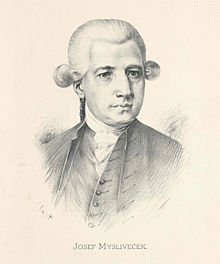|
Farnace (Mysliveček)
 Farnace is an 18th-century Italian opera in 3 acts by the Czech composer Josef Mysliveček. It was composed to a libretto by the Italian poet Antonio Maria Lucchini that is best known from a setting by Antonio Vivaldi first produced at the Teatro Sant'Angelo in Venice for the carnival operatic season of 1727. For a performance in the 1760s, it would only be expected that a libretto of such age would be abbreviated and altered to suit contemporary operatic taste; this libretto was unusually old, even older than all but one of the librettos by Metastasio that continued by be set in the 1760s. The cuts and changes in the text made for the 1767 performance of Mysliveček's opera are not attributable.[1] Indeed, they are quite extensive; not a single one of Lucchini's original aria texts was re-set by Mysliveček. However, it is the same cut libretto of Farnace, with small variants, used by the Neapolitan Davide Perez in his opera for the Regio Teatro of Turin in the 1751 Carnival, and repeated in Rome at the Torre Argentina Theater the following year, and in Messina (Regio Teatro della Munizione) and Naples (Teatro di San Carlo) in 1753 and again in 1757. Performance historyThe opera was first performed at the Teatro San Carlo in Naples on 4 November 1767, the nameday of King Charles III of Spain, the former ruler of the Kingdom of Naples whose birthday and nameday were still celebrated with operatic productions under the rule of his son Ferdinand. It was commissioned in the wake of the success of the composer's opera Il Bellerofonte, which had been given earlier the same year, and is known to have been successful, in spite of a less distinguished cast. It was repeated in Prague in December 1768 after the composer's triumphant return to his native city. Roles
Synopsis18th-century Italian operas in the serious style are almost always set in a distant or legendary past and are built around historical, pseudo-historical, or mythological characters.
The main character of Lucchini's Farnace is based on the life of King Pharnaces II of Pontus, whose conflicts with the Roman Republic eventually led to his death. Farnace has been defeated in battle by Pompeo. In order to avoid seeing his entire family falling into the hands of the enemy, Farnace commands his wife Tamiri to kill their son and then herself, although this never happens. Selinda, Farnace's sister, is taken captive by the Roman Atridate, who falls in love with her, as does the army captain Gilades. Selinda plays them off one another in an attempt to save her brother. Her efforts succeed and everyone is spared. Vocal set piecesAct 1Scene 2 – Aria of Pompeo, "Accendi il tuo furore" Act 2Scene 2 – Aria of Selinda, "Non mi spaventa quel tuo furore" Act 3Scene 2 – Aria of Selinda, "Non vi fidate" ScoreThe complete score of Farnace is available for study online on the Italian website Internet Culturale in the form of a reproduction of a manuscript once in the possession of the Teatro San Carlo of Naples. ReferencesNotes
Cited sources
External links |